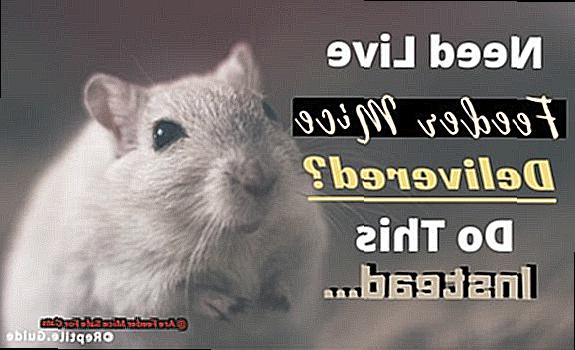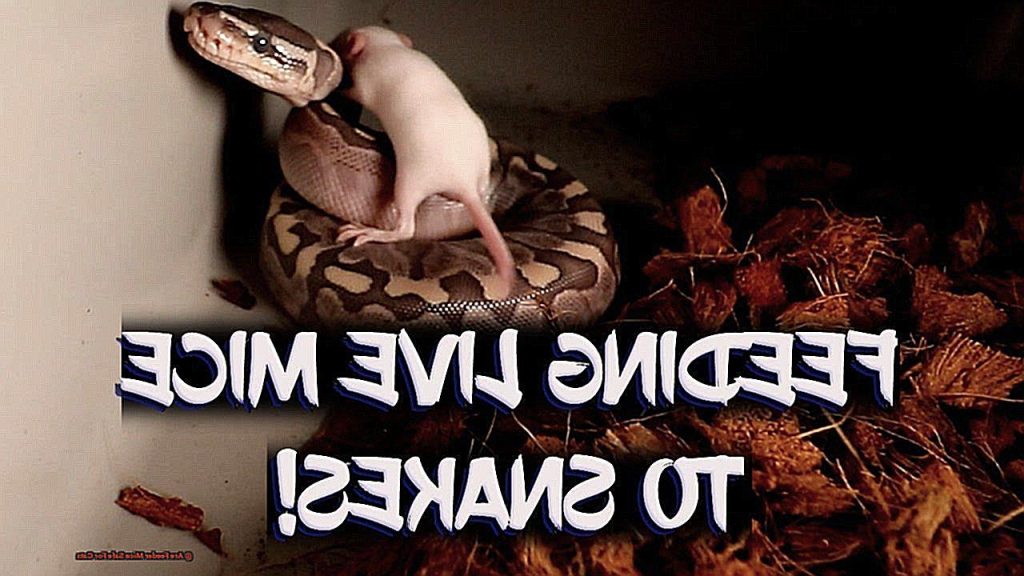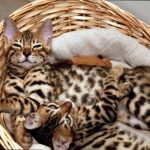We all know that our beloved cats are natural hunters, and the thought of them chasing after a mouse may seem like a no-brainer.
But as responsible pet owners, we want to ensure that every aspect of our cat’s diet is safe and healthy for them. This brings us to the question: are feeder mice a suitable option for our feline friends?
While it may seem like an obvious choice, there are some important factors to consider before adding feeder mice to your cat’s meal plan. In this blog post, we’ll explore the safety of feeder mice for cats and provide you with all the necessary information to make an informed decision.
So let’s dive in and put those concerns at ease.
Are Feeder Mice Safe For Cats?
Contents
As a cat owner, you want to provide your feline friend with the best possible diet to keep them healthy and happy. So when you hear about feeding feeder mice to cats, you may have some questions and concerns. Is it safe? Is it nutritious? What are the potential risks and benefits?
Let’s dive into the ongoing debate surrounding this topic and provide some insights to help you make an informed decision for your cat’s diet.
What Are Feeder Mice?
Feeder mice are small rodents that are primarily bred as food for reptiles, birds of prey, and other carnivorous animals. They are typically available as frozen or live prey and can be purchased from pet stores or online retailers.
Proponents of feeding feeder mice to cats argue that it is a natural diet for felines, as they are natural predators and have been consuming mice for centuries. However, this argument is not without its detractors.
Risks Associated with Feeding Feeder Mice to Cats
One of the main concerns with feeding feeder mice to cats is the potential risks involved. First and foremost, there is a risk of choking or injuries from live prey if the cat is not accustomed to hunting. It’s important to monitor your cat’s behavior during feeding and choose an appropriate size of prey.

Another major concern is the exposure to parasites and diseases. Feeder mice may carry diseases that can be harmful to cats, such as salmonella or E. coli. This risk is higher if the feeder mice come from less reputable sources.
Additionally, there is a concern about the nutritional value of feeder mice for cats. While they are high in protein, they may not provide all the necessary vitamins and nutrients for a complete and balanced diet. This can be especially problematic for cats with specific dietary needs or health conditions.
Alternatives to Feeder Mice
If you’re not comfortable with the risks associated with feeding feeder mice to your cat, there are alternatives to consider. Commercially available cat food with high protein content can provide a similar nutritional profile without the potential dangers.
You can also opt for homemade recipes using natural ingredients, such as cooked chicken or turkey, to provide your cat with a high protein diet.
What are Feeder Mice?
Feeder mice, also known as pinkie mice or fuzzies, are small rodents that are bred and sold as food for other animals. They are commonly used to feed reptiles and birds of prey, but they can also be fed to cats who have a strict carnivorous diet. These mice are bred in large numbers in facilities specifically for the purpose of being sold as food.
Different Sizes and Ages: Which One is Best for Cats?
Feeder mice come in different sizes and ages, depending on the animal they are being fed to. For cats, feeder mice are usually young and small, around the size of a mouse or rat that you would find in the wild. It is important to note that feeder mice should not be confused with pet mice. Pet mice are bred and cared for as companion animals, while feeder mice are bred solely for consumption by other animals.
The Potential Health Risks of Feeder Mice for Cats
Due to their purpose as food, feeder mice are not given proper care or nutrition. This can result in them carrying diseases or parasites that can be harmful to whatever animal consumes them. Feeder mice may also be fed a diet that contains hormones or medication to make them grow faster or appear more appealing to potential buyers. This can pose a risk to cats who consume these mice.
Furthermore, feeder mice are usually kept in overcrowded and unsanitary conditions, which can lead to a host of health problems. These unsanitary conditions can cause the mice to carry bacteria, viruses, and parasites that can be transmitted to your cat.
It’s also worth mentioning that there are different types of feeder mice available on the market. Some may be bred specifically for their high protein content, while others may be genetically modified to produce certain traits desired by breeders. This can potentially introduce unknown substances into your cat’s diet.
Live vs. Frozen Feeder Mice: What’s the Difference?
Feeder mice can be purchased live or frozen, with frozen being the more common option. However, even frozen feeder mice can carry diseases if they were not properly stored or handled before being frozen. Live feeder mice may also pose a risk to your cat, as they can potentially injure or harm your cat during feeding.
Nutritional Value of Feeder Mice for Cats
As cat owners, we all want to provide our furry companions with the best possible nutrition for a long and healthy life. And while commercial cat food may seem like the most convenient option, have you ever considered adding feeder mice to your cat’s diet? These small rodents may seem like an unconventional choice, but they actually offer a wide range of essential nutrients that can benefit your cat in more ways than one.
Protein-Packed Meals
Cats are obligate carnivores, meaning they require a diet high in meat-based protein. Feeder mice are a natural and biologically appropriate source of protein for cats. In fact, one feeder mouse can provide up to 5 grams of protein for your feline friend. This is especially beneficial for cats who may have sensitivities or allergies to other protein sources commonly found in commercial cat food.
Not Just Protein, But Essential Nutrients Too
But it’s not just about the protein – feeder mice also contain essential amino acids, fatty acids, and vitamins that are necessary for your cat’s overall health and well-being. These nutrients play a crucial role in maintaining your cat’s immune system, promoting healthy growth and development, and supporting their vital organs.
Hydration Hero
Did you know that cats are notoriously bad at staying hydrated? This is because they have a low thirst drive and rely on their food to provide them with moisture. Feeder mice are not only high in protein and essential nutrients, but they also have a high moisture content. This makes them a great source of hydration for cats who may not drink enough water on their own.
Natural and Unprocessed Nutrition
Unlike commercially produced cat food, feeder mice are a more natural and unprocessed source of nutrition. This means that they do not contain any artificial preservatives or fillers that may be harmful to your cat’s health. Plus, cats often find the texture and taste of feeder mice more appealing, making mealtime more enjoyable for them.
Feeding Tips and Precautions
While feeder mice can be a great addition to your cat’s diet, it is important to keep a few things in mind. First, make sure that the feeder mice are fed a healthy and balanced diet themselves. This will ensure that they are providing your cat with all the necessary nutrients. It is also recommended to feed frozen feeder mice to reduce the risk of parasites or diseases that may be present in live prey.
Potential Risks of Feeding Feeder Mice to Cats
It’s a natural instinct for cats to hunt and catch prey, and some may even argue that it’s an essential part of their diet. That’s where feeder mice come in – these small rodents are bred specifically to be fed to other animals, including cats. But before you start tossing these tiny critters into your cat’s bowl, there are some potential risks you should be aware of.
Disease Transmission
Feeder mice are not raised under controlled conditions like pet mice. This means they are more susceptible to carrying diseases and parasites that can be harmful to your cat. If your cat consumes an infected feeder mouse, they can become sick or develop long-term health issues. This risk is not worth taking when there are plenty of other safe and nutritious food options available for cats.
Contamination of Harmful Substances
Feeder mice may also be contaminated with harmful substances such as pesticides or heavy metals. These substances can be transferred to your cat through consumption and can have negative effects on their health. Ingesting these toxins can lead to a variety of health issues, ranging from gastrointestinal problems to organ damage.
Nutritional Deficiencies
While feeder mice may seem like a complete and balanced meal for cats, they may not provide all the necessary nutrients for a healthy diet. Feeder mice are usually fed a high-protein and high-fat diet to promote fast growth, which may not meet the nutritional needs of domestic cats. This can result in deficiencies or imbalances in important vitamins and minerals, leading to health problems over time.
Risks to Other Pets or Humans
Feeding feeder mice to cats can also pose a danger to other pets or even humans in the household. Cats may leave behind remains of the mouse, including bones and fur, which can be a choking hazard for smaller pets or children.
It is also possible for cats to transfer any diseases or parasites they may have contracted from the feeder mice to other animals or humans in close contact with them.
Alternatives to Feeder Mice for Cat Nutrition
Raw Diet:
One option that has gained popularity in recent years is feeding cats a raw diet. This diet consists of uncooked meat, organs, and bones, mimicking the natural diet of wild cats. Raw meat is rich in protein, essential amino acids, and enzymes that can benefit a cat’s overall health. However, it is crucial to note that this diet requires careful planning and preparation to ensure that cats receive a balanced diet.
Commercial Cat Food:
Another alternative is high-quality commercial cat food. These foods are specifically formulated to meet the nutritional needs of cats and have been extensively tested and approved by veterinarians. Look for cat foods that list meat as the main ingredient and avoid those with fillers or by-products.
Freeze-Dried or Dehydrated Raw Food:
For those looking for a more natural option, there are freeze-dried or dehydrated raw food options available. These foods are made from real meat that has been gently cooked and then dehydrated, preserving its nutritional value. They can be rehydrated with water and served as a meal or used as a topper for dry food.
Canned Cat Food:
Canned cat food is another great alternative to feeder mice. It offers a high moisture content, which promotes hydration in cats. It also tends to be lower in carbohydrates compared to dry food, making it a healthier option for felines. Plus, with a variety of flavors and textures available, your cat will never get bored.
Homemade Cat Food:
Lastly, some pet owners may choose to make their own homemade cat food. This option allows for complete control over the ingredients used and can be tailored to meet the specific needs of each individual cat. However, it is crucial to consult with a veterinarian or animal nutritionist to ensure that the homemade diet is balanced and meets all of the cat’s nutritional requirements.
Precautions When Feeding Feeder Mice to Cats
While there are various options available, some cat owners choose to feed their cats feeder mice. This natural and protein-rich option can be beneficial for cats with a primarily raw diet. However, there are some precautions that cat owners should be aware of to ensure their cat’s safety and well-being.
Purchase from a reputable source
Just like any other food, it is essential to know where the feeder mice are coming from. Some breeders or suppliers may not have proper hygiene practices, which can lead to mice carrying diseases or parasites. It is crucial to purchase feeder mice from a trusted source to ensure the safety of your cat.
Proper handling and storage
Feeder mice can carry a variety of bacteria, so it is important to handle them carefully. After handling them, make sure to wash your hands thoroughly with soap and water. Also, keep the feeder mice in a sealed container in the refrigerator until feeding time to prevent any cross-contamination.
Freeze before feeding
To further reduce the risk of bacteria or parasites, it is recommended to freeze the feeder mice for at least 24 hours before feeding them to your cat. This will help kill any potential harmful organisms. Thaw the mice in the refrigerator before serving them to your cat.
Supervise feedings
Cats can become overly excited while hunting their prey, which can lead to choking or injury. It is important to supervise your cat’s feeding session and offer smaller mice or cut up larger ones into bite-sized pieces to prevent any accidents.
Dispose of uneaten mice
If your cat does not finish their meal, make sure to dispose of any uneaten feeder mice immediately. Leaving them out can attract pests and lead to contamination. Remember to clean and disinfect any surfaces or bowls that came into contact with the feeder mice.
Monitor for food sensitivities
Just like humans, some cats may have food sensitivities or allergies. It is best to introduce feeder mice slowly into their diet and monitor their reactions. If you notice any adverse effects such as vomiting or diarrhea, consult with your veterinarian.
Conclusion
In conclusion, the safety of feeder mice for cats remains a topic of debate. While they may seem like a natural and biologically appropriate choice for our feline friends, it is crucial to thoroughly evaluate the potential risks and benefits before incorporating them into their diet.
On one hand, feeder mice can offer essential nutrients and hydration for cats. However, on the other hand, there are concerns about disease transmission and potential nutritional deficiencies. As responsible pet owners, it is our responsibility to carefully source feeder mice from reputable suppliers and handle them properly before feeding them to our cats.
Furthermore, monitoring our cat’s behavior during feeding and promptly disposing of any uneaten prey is essential in preventing contamination. It is also worth considering alternative options such as raw diets, high-quality commercial cat food, or homemade recipes that can provide similar benefits without the potential risks.
Ultimately, as pet owners, we have a duty to make informed decisions about our cat’s diet.






